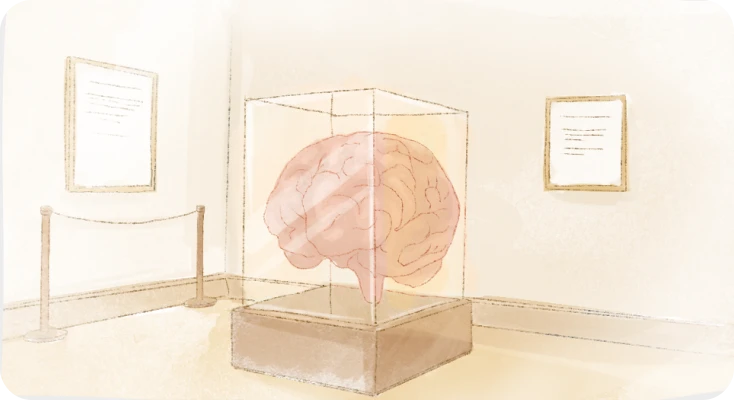IQ stands for intelligence quotient and measures a person’s ability to reason and solve problems. It is typically assessed through standardized tests that evaluate skills like logical reasoning, problem-solving, memory, and verbal comprehension.
The average IQ score is 100, with most people scoring between 85 and 115—and any score above 125 is considered high. (based on David Wechsler’s most common test)
- 95% of the population falls into the average IQ score between 70 and 130.
- The average IQ score in the US is 98. People with the highest IQ live in Massachusetts (104.3), while citizens of Mississippi have the lowest average IQ (94.2).
- The country with the highest IQ score is Japan (106.48).
While IQ can provide insight into certain mental and cognitive abilities. It is just one way to judge how well someone did on a certain test, and it might not show their full range of intellectual abilities.
It is important to note that IQ tests don’t capture all aspects of intelligence, such as creativity, emotional understanding, empathy, or practical skills, which sometimes are more important than intellectual abilities.
Ready to enhance your EQ skills? Take a quick, free test from Breeze to know your score and personal development plan today!
How do IQ tests work in adults?
Note that IQ tests measure cognitive abilities only (yes, it isn’t about overall intelligence). It evaluates such parameters:
- Skills and knowledge acquired throughout life
- Verbal and nonverbal abilities
- Ability to reason to perform new tasks that you can’t do automatically
- Ability to analyze and interpret real-world quantitative information
- Ability to make sense of abstract information and solve problems
At the same time, IQ scores are pretty complicated and depend on many factors, from test-taking skills to how licensed psychologists interpret the results.
IQ test scores
There’s a good chance you fall into the average IQ segment—95% of the population scores between 70 and 130.
But IQ scores are just numbers that supposedly show how good you are at solving specific tasks. You might score differently on different tests, but your scores probably still fall in the average IQ range, whether on the low or high spectrum.
More specifically, you likely have an average IQ in the USA or whichever country you live in, meaning you scored the same as most people where you live.
What is the average IQ in the USA?
The US average IQ is 98, which makes the United States the 31st country on the list of average IQs globally. [1, 2]
Which are the states with the highest average IQ in the US? These are [3]:
- Massachusetts (104.3)
- New Hampshire (104.2)
- North Dakota (103.8)
And what are the states with the lowest average IQ in America? These include:
- Mississippi (94.2)
- Louisiana (95.3)
- California (95.5)
Moreover, according to the Flynn Effect, the American average IQ keeps rising at about 3 points per decade. This happens because of improved nutrition during pregnancy, changes in education systems, better family support, and healthcare.
Average IQ by U.S. State (Top 3)
| State | Average IQ |
| Massachusetts | 104.3 |
| New Hampshire | 104.2 |
| North Dakota | 103.8 |
Average IQ by U.S. State (Bottom 3)
| State | Average IQ |
| Mississippi | 94.2 |
| Louisiana | 95.3 |
| California | 95.5 |
What is the average IQ in the world?
The average IQ score for adults in the world is 100 (based on David Wechsler’s most common test). At the same time, the scientist established that the standard deviation from this score is 15.
This means you have an average IQ if your score is between 85 and 115 (within 15 points of 100 in either direction).
What is a normal IQ range?
- Everything from 70 to 85 is also considered an average but low average.
- And everything from 115 to 130 is a high average.
A high IQ and a low IQ:
- A score over 130 is in the top 2% of the population. It’s considered high and means you may be gifted or even a genius.
- A score under 70 is considered low and can indicate a developmental disability.

Stats on the highest IQ by country
According to research by the Ulster Institute, there are three countries with the highest average IQ [2]:
- Japan (106.48)
- Taiwan (106.67)
- Singapore (105.89)
The average IQ score in China is 104.1, placing it in fourth place among countries with high IQ scores.
What countries have the lowest IQ in the world?
If education, nutrition, and healthcare improvements positively influence IQ, in some cases, regions lacking these resources can rank lower on the scale. Reports state that the countries with the so-called “lowest IQ score”. [4]
- Nepal (42.99)
- Liberia & Sierra Leone (45.07)
- Guatemala (47.72)
IQ isn’t everything
Average IQ: Insights by age, gender, and race
- The average IQ is 100 for ages 20-24 and 99 for ages 25-44. It drops to 97 for ages 45-54, 94 for ages 55-64, 90 for 65-69, 86 for ages 70-74 and 79 for ages 75+.
- There’s no statistically important difference between average IQ in men and women. [5]
- A hot climate might negatively influence intelligence development and average IQ. [6]
- The average IQ for East Asians is about 106. For Whites, it’s about 100. For Native American people, it’s about 85. And in sub-Saharan African people, it’s 70. [7]
Age vs. Average IQ score
| Age Group Range | Average IQ scores |
| 20–24 | 100 |
| 25–44 | 99 |
| 45–54 | 97 |
| 55–64 | 94 |
| 70–74 | 86 |
| 75+ | 79 |
How was IQ measured in the past?
Scientists have tried to design generalized intelligence tests since the late 1800s, but in 1905, a Frenchman named Alfred Binet created the first modern-day IQ test. Binet wanted to evaluate children’s cognitive abilities by comparing their mental and biological age.
How did Binet figure out their mental age? He asked them general knowledge questions that an average child their age could answer correctly. If a 6-year-old succeeded on all questions that most 7-year-olds answered correctly and then got stumped, the child’s mental age was 7. If a 7-year-old succeeded on all questions that most 8-year-olds answered correctly, their mental age was 8.
As a result, the formula was: IQ score = biological age — mental age
Psychologist William Stern agreed with many of Binet’s ideas but thought that dividing mental age by biological age would be a more accurate comparison. This calculation meant that if a 7-year-old could solve tasks as well as the average 7-year-old, they scored 7/7, which was an IQ score of 1.
On the other hand, a 7-year-old who performed at a level of the average 8-year-old had a score of 8/7 or an IQ of 1.1, which is a little higher than average IQ. As a result, the word “quotient” came from how scientists calculated early IQ scores.
Modern IQ tests
These modern intelligence quotient tests are applied in schools, workplaces, the military, and psychological evaluations to assess cognitive strengths, diagnose learning disabilities, or guide career decisions. Famous and most modern IQ tests include:
- Wechsler Adult Intelligence Scale (WAIS) is commonly used in clinical and educational settings to assess adult intelligence.
- The Stanford-Binet Intelligence Scale is widely used in schools and for identifying gifted individuals.
- The Raven’s Progressive Matrices is popular in research and non-verbal reasoning assessments, often used for cross-cultural comparisons.
- The Cattell Culture Fair Intelligence Test aims to minimize cultural and language biases.
- The Woodcock-Johnson Tests of Cognitive Abilities are used in educational psychology.
What factors influence a person’s IQ?
While it might seem like intelligence is a permanent gauge of your smarts, the reality is more flexible. Your brainpower can be altered in a few ways, and here are the most common things that may influence your IQ level. Genetics are important, but education, family, nutrition, and environmental factors can also affect IQ.
1. Education and lifestyle changes
Sadly, it doesn’t mean going to fancy places to discover more about the world around you. But if you can improve your cognitive skills through solving mathematical problems or learning poems by heart, you may score higher on some IQ tests.
It is also possible for a child’s socioeconomic background to affect how smart they are. Lack of access to educational resources and opportunities may cause kids from low-income families to have lower IQs. [8] Moreover, bias and discrimination in the workplace can lower the average intelligence of some groups.
Similarly, negative lifestyle changes can lead to a lower IQ score. If you abuse substances (or toxic relationships) like alcohol or drugs, you’re literally killing brain cells. This interferes with your cognitive skills and with acquiring new skills and knowledge. Hence, IQ scores will decrease.
2. Aging
Interestingly, scientists found that teenagers who passed IQ tests in early adolescence improved their scores by 20 points on average four years later. [9] Also, your IQ can improve as you acquire more skills and knowledge over time, and your brain actively develops until your mid-20s or 30s.
However, age can also negatively affect IQ level, meaning the older you become, the higher the chance of getting a lower score if you don’t train your mental skills. Moreover, older adults are more vulnerable to dementia, which profoundly affects their mental abilities.
3. Genetics
Genetic factors encompassing the brain’s structural and functional components serve as the basis for intellectual capacity. Research suggests that the heritability of general intelligence is estimated to be as high as 0.8, with genetic influences becoming more pronounced as individuals age [10]
4. Family history
IQ is also affected by the family you grow up with. Children who grow up in a safe and stimulating environment with parents who support and give them resources may have higher IQs than children who do not have these advantages.
Stressful and conflict-filled families may also contribute to lower IQs in their children since they do not receive enough emotional support and are constantly exposed to stressful situations.
5. Nutrition
Balanced and healthy food can also affect IQ. Simply put, the brain needs certain nutrients to work right, like iron, omega-3 fatty acids, and B vitamins. Children who eat a healthy, well-balanced diet tend to have higher IQs than those who don’t, according to researchers at Bristol University. [11]
The Flynn Effect
The steadily rising IQ scores over the last 100 years are due to something called the Flynn effect, which is named after the political scientist James Flynn. Since the early 20th century, average IQ scores of roughly three IQ points per decade have been driving raw scores on IQ tests in many populations to rise.
Consequently, someone scoring the same raw on an IQ assessment today would have a higher IQ than someone scoring the same raw in the past.
There are many complicated reasons for the Flynn effect. The rise in IQ scores is likely due to a number of factors, such as better nutrition, easier access to education, and advances in technology. These changes in society have made it easier for people to get intellectual stimulation and improve their thinking skills. People are now better at solving problems, thinking about things in a general way, and other cognitive skills that are measured by IQ.
FAQ
Why is the concept of average IQ so popular?
Standardized tests make IQ relatively easy to measure, unlike emotional intelligence or creativity. As people love comparing numbers, especially when arguing about who’s the smartest, showing off good IQ scores is an easy way to do that.
Who has the highest IQ ever?
As of 2024, YoungHoon Kim from South Korea has the highest recorded IQ, with an impressive score of 276. What is the highest IQ in the US? American writer Christopher Michael Langan has an IQ of between 195 and 210, which makes him the smartest person in the country.
Is the IQ level mean the same for everyone?
As we’ve already mentioned, the results of most IQ tests depend on interpretation. For example, researchers have found that women perform slightly better on some verbal tasks, and men perform better on some spatial ability tests.
If a specialist who interprets results believes that spatial ability is more important for IQ or is biased against women, they may give men a higher score. The same goes for racial differences and other biases, which is frustrating, but it happens.
How does IQ score’s meaning impact everyday life?
IQ tests help us understand a few things about ourselves:
- Learning style
- Problem-solving skills
- Cognitive strengths
- Areas for improvement
- Adaptability
- Multitasking ability
What do IQ tests not score?
If a person lacks emotional intelligence, someone else who has difficulties with problem-solving but has high social intelligence may be a better leader. Managing interactions and resolving conflicts are important skills that IQ tests can’t measure. Also, creative thinking—which you can’t estimate with IQ tests or IQ scores—might give you an advantage when it comes to fine art, music, and other creative pursuits.
What was Albert Einstein’s IQ?
The analysis assumes that Albert Einstein was the most intelligent man in the world when he was alive, and the result is that his IQ is 160. However, since an accurate test did not exist at the time, no one knows with certainty what Einstein’s IQ was.
What is Elon Musk’s IQ?
Elon Musk biographer Seth Abramson states that Elon Musk’s IQ is between 100 and 110, which is average. Yet, Elon Musk himself did not disclose his IQ score or that he takes any IQ tests.
What is the global average IQ?
The average IQ in the world is approximately 100.
Sources:
- Average IQ by State in the US for 2025
- Average IQ by Country 2025, World Population Review
- DataPandas—Average IQ by State, 2024
- Average IQ by Country, DataPandas 2025
- Richard Lynn, Satoshi Kanazawa, A longitudinal study of sex differences in intelligence at ages 7, 11 and 16 years, Personality and Individual Differences, Volume 51, Issue 3, 2011.
- Donald I. Templer, John S. Stephens, The relationship between IQ and climatic variables in African and Eurasian countries, Intelligence, Volume 46, 2014.
- Rushton, J. P., & Jensen, A. R. (2005). Thirty years of research on race differences in cognitive ability. Psychology, Public Policy, and Law
- Hair, N. L., Hanson, J. L., Wolfe, B. L., & Pollak, S. D. (2015). Association of Child Poverty, Brain Development, and Academic Achievement. JAMA pediatrics
- Ramsden, S., Richardson, F., Josse, G. et al. Verbal and non-verbal intelligence changes in the teenage brain. Nature 479
- Emily A. Willoughby, Matt McGue, William G. Iacono, James J. Lee, Genetic and environmental contributions to IQ in adoptive and biological families with 30-year-old offspring, Intelligence, Volume 88, 2021
- Processed food diet in early childhood diet may lower subsequent IQ, University of Bristol, 2011.
Disclaimer
This article is for general informative and self-discovery purposes only. It should not replace expert guidance from professionals.
Any action you take in response to the information in this article, whether directly or indirectly, is solely your responsibility and is done at your own risk. Breeze content team and its mental health experts disclaim any liability, loss, or risk, personal, professional, or otherwise, which may result from the use and/or application of any content.
Always consult your doctor or other certified health practitioner with any medical questions or concerns
Breeze articles exclusively cite trusted sources, such as academic research institutions and medical associations, including research and studies from PubMed, ResearchGate, or similar databases. Examine our subject-matter editors and editorial process to see how we verify facts and maintain the accuracy, reliability, and trustworthiness of our material.
Was this article helpful?






